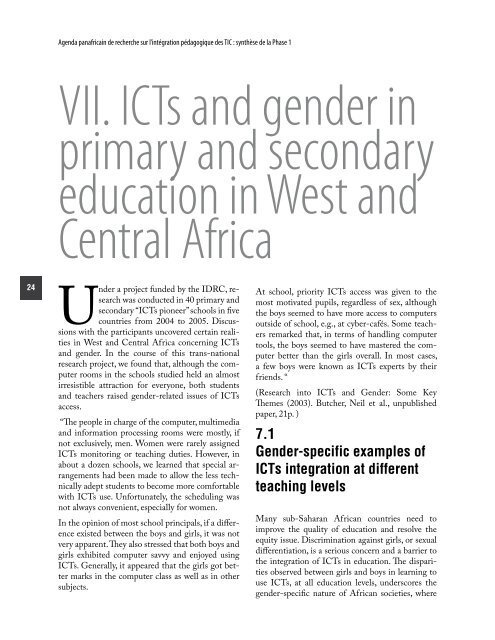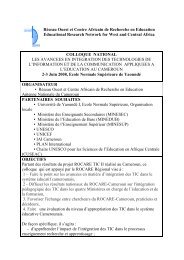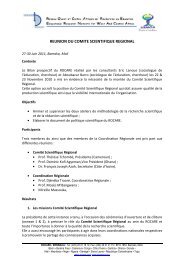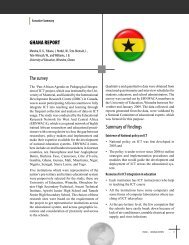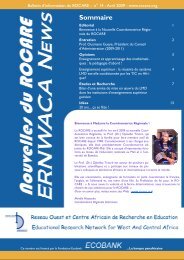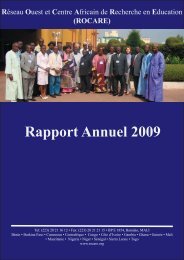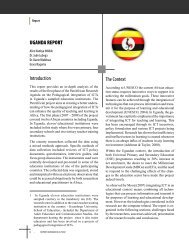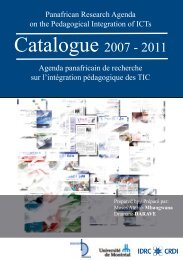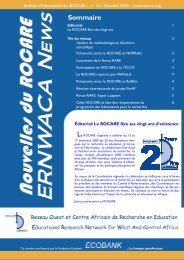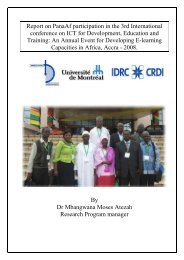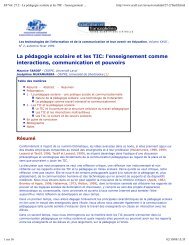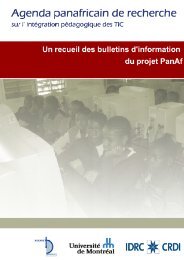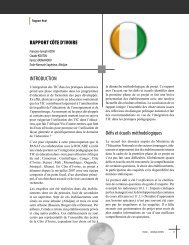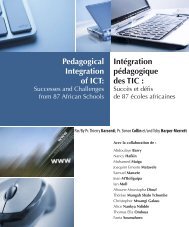Download the full report - ERNWACA
Download the full report - ERNWACA
Download the full report - ERNWACA
You also want an ePaper? Increase the reach of your titles
YUMPU automatically turns print PDFs into web optimized ePapers that Google loves.
Agenda panafricain de recherche sur l’intégration pédagogique des TIC : synthèse de la Phase 1<br />
VII. ICTs and gender in<br />
primary and secondary<br />
education in West and<br />
Central Africa<br />
24<br />
Under a project funded by <strong>the</strong> IDRC, research<br />
was conducted in 40 primary and<br />
secondary “ICTs pioneer” schools in five<br />
countries from 2004 to 2005. Discussions<br />
with <strong>the</strong> participants uncovered certain realities<br />
in West and Central Africa concerning ICTs<br />
and gender. In <strong>the</strong> course of this trans-national<br />
research project, we found that, although <strong>the</strong> computer<br />
rooms in <strong>the</strong> schools studied held an almost<br />
irresistible attraction for everyone, both students<br />
and teachers raised gender-related issues of ICTs<br />
access.<br />
“The people in charge of <strong>the</strong> computer, multimedia<br />
and information processing rooms were mostly, if<br />
not exclusively, men. Women were rarely assigned<br />
ICTs monitoring or teaching duties. However, in<br />
about a dozen schools, we learned that special arrangements<br />
had been made to allow <strong>the</strong> less technically<br />
adept students to become more comfortable<br />
with ICTs use. Unfortunately, <strong>the</strong> scheduling was<br />
not always convenient, especially for women.<br />
In <strong>the</strong> opinion of most school principals, if a difference<br />
existed between <strong>the</strong> boys and girls, it was not<br />
very apparent. They also stressed that both boys and<br />
girls exhibited computer savvy and enjoyed using<br />
ICTs. Generally, it appeared that <strong>the</strong> girls got better<br />
marks in <strong>the</strong> computer class as well as in o<strong>the</strong>r<br />
subjects.<br />
At school, priority ICTs access was given to <strong>the</strong><br />
most motivated pupils, regardless of sex, although<br />
<strong>the</strong> boys seemed to have more access to computers<br />
outside of school, e.g., at cyber-cafés. Some teachers<br />
remarked that, in terms of handling computer<br />
tools, <strong>the</strong> boys seemed to have mastered <strong>the</strong> computer<br />
better than <strong>the</strong> girls overall. In most cases,<br />
a few boys were known as ICTs experts by <strong>the</strong>ir<br />
friends. “<br />
(Research into ICTs and Gender: Some Key<br />
Themes (2003). Butcher, Neil et al., unpublished<br />
paper, 21p. )<br />
7.1<br />
Gender-specific examples of<br />
ICTs integration at different<br />
teaching levels<br />
Many sub-Saharan African countries need to<br />
improve <strong>the</strong> quality of education and resolve <strong>the</strong><br />
equity issue. Discrimination against girls, or sexual<br />
differentiation, is a serious concern and a barrier to<br />
<strong>the</strong> integration of ICTs in education. The disparities<br />
observed between girls and boys in learning to<br />
use ICTs, at all education levels, underscores <strong>the</strong><br />
gender-specific nature of African societies, where


